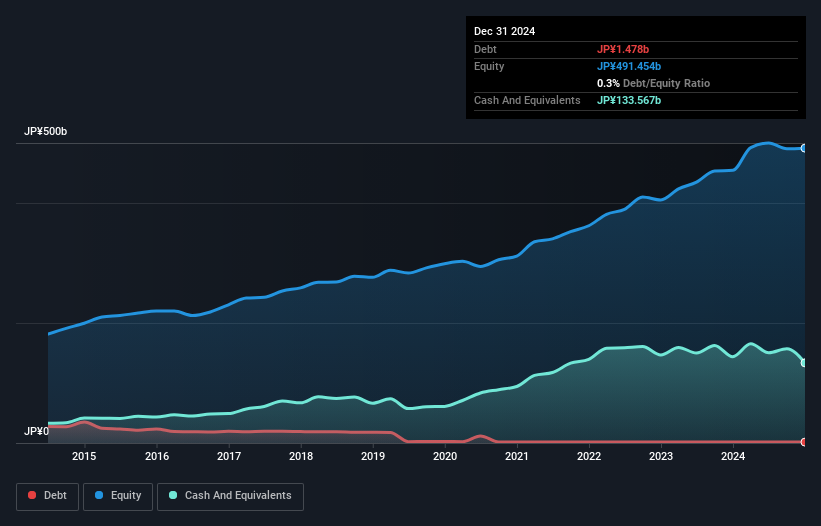- Japan
- /
- Electronic Equipment and Components
- /
- TSE:7701
Shimadzu (TSE:7701) Has A Pretty Healthy Balance Sheet
David Iben put it well when he said, 'Volatility is not a risk we care about. What we care about is avoiding the permanent loss of capital.' It's only natural to consider a company's balance sheet when you examine how risky it is, since debt is often involved when a business collapses. We can see that Shimadzu Corporation (TSE:7701) does use debt in its business. But the more important question is: how much risk is that debt creating?
We check all companies for important risks. See what we found for Shimadzu in our free report.Why Does Debt Bring Risk?
Debt assists a business until the business has trouble paying it off, either with new capital or with free cash flow. Ultimately, if the company can't fulfill its legal obligations to repay debt, shareholders could walk away with nothing. However, a more common (but still painful) scenario is that it has to raise new equity capital at a low price, thus permanently diluting shareholders. Of course, the upside of debt is that it often represents cheap capital, especially when it replaces dilution in a company with the ability to reinvest at high rates of return. The first step when considering a company's debt levels is to consider its cash and debt together.
What Is Shimadzu's Debt?
As you can see below, Shimadzu had JP¥1.48b of debt at December 2024, down from JP¥1.63b a year prior. But it also has JP¥133.6b in cash to offset that, meaning it has JP¥132.1b net cash.

A Look At Shimadzu's Liabilities
We can see from the most recent balance sheet that Shimadzu had liabilities of JP¥143.3b falling due within a year, and liabilities of JP¥23.5b due beyond that. Offsetting these obligations, it had cash of JP¥133.6b as well as receivables valued at JP¥137.1b due within 12 months. So it can boast JP¥103.9b more liquid assets than total liabilities.
This short term liquidity is a sign that Shimadzu could probably pay off its debt with ease, as its balance sheet is far from stretched. Succinctly put, Shimadzu boasts net cash, so it's fair to say it does not have a heavy debt load!
See our latest analysis for Shimadzu
On the other hand, Shimadzu saw its EBIT drop by 5.7% in the last twelve months. That sort of decline, if sustained, will obviously make debt harder to handle. There's no doubt that we learn most about debt from the balance sheet. But ultimately the future profitability of the business will decide if Shimadzu can strengthen its balance sheet over time. So if you're focused on the future you can check out this free report showing analyst profit forecasts.
But our final consideration is also important, because a company cannot pay debt with paper profits; it needs cold hard cash. Shimadzu may have net cash on the balance sheet, but it is still interesting to look at how well the business converts its earnings before interest and tax (EBIT) to free cash flow, because that will influence both its need for, and its capacity to manage debt. In the last three years, Shimadzu's free cash flow amounted to 41% of its EBIT, less than we'd expect. That weak cash conversion makes it more difficult to handle indebtedness.
Summing Up
While it is always sensible to investigate a company's debt, in this case Shimadzu has JP¥132.1b in net cash and a decent-looking balance sheet. So we don't have any problem with Shimadzu's use of debt. Over time, share prices tend to follow earnings per share, so if you're interested in Shimadzu, you may well want to click here to check an interactive graph of its earnings per share history.
If, after all that, you're more interested in a fast growing company with a rock-solid balance sheet, then check out our list of net cash growth stocks without delay.
New: Manage All Your Stock Portfolios in One Place
We've created the ultimate portfolio companion for stock investors, and it's free.
• Connect an unlimited number of Portfolios and see your total in one currency
• Be alerted to new Warning Signs or Risks via email or mobile
• Track the Fair Value of your stocks
Have feedback on this article? Concerned about the content? Get in touch with us directly. Alternatively, email editorial-team (at) simplywallst.com.
This article by Simply Wall St is general in nature. We provide commentary based on historical data and analyst forecasts only using an unbiased methodology and our articles are not intended to be financial advice. It does not constitute a recommendation to buy or sell any stock, and does not take account of your objectives, or your financial situation. We aim to bring you long-term focused analysis driven by fundamental data. Note that our analysis may not factor in the latest price-sensitive company announcements or qualitative material. Simply Wall St has no position in any stocks mentioned.
About TSE:7701
Flawless balance sheet with acceptable track record.
Similar Companies
Market Insights
Community Narratives


Recently Updated Narratives


Alphabet: The Under-appreciated Compounder Hiding in Plain Sight


MINISO's fair value is projected at 26.69 with an anticipated PE ratio shift of 20x


The Quiet Giant That Became AI’s Power Grid
Popular Narratives


The company that turned a verb into a global necessity and basically runs the modern internet, digital ads, smartphones, maps, and AI.


MicroVision will explode future revenue by 380.37% with a vision towards success



